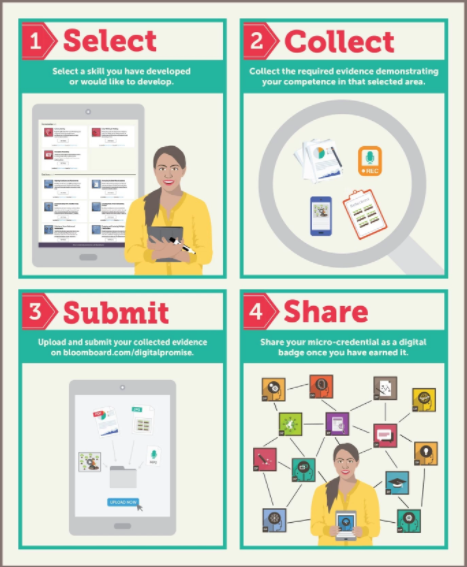 Educators are always learning. In the classroom with students, at workshops and trainings, through the process of developing and facilitating lessons, and in so many more places educators are constantly building and refining their skills. Often, the skills developed in their day-to-day practice prove to be the most valuable tools for educators. With micro-credentials, educators can now be formally recognized for the skills and competencies they learn throughout their careers. Micro-credentials are research-backed, expert-assessed, representations of learned skills or competencies that can be presented as a digital badge. In partnership with Digital Promise and their micro-credential platform, Maker Ed is excited to share “Getting Started with Making,” a set of six maker education micro-credentials.
Educators are always learning. In the classroom with students, at workshops and trainings, through the process of developing and facilitating lessons, and in so many more places educators are constantly building and refining their skills. Often, the skills developed in their day-to-day practice prove to be the most valuable tools for educators. With micro-credentials, educators can now be formally recognized for the skills and competencies they learn throughout their careers. Micro-credentials are research-backed, expert-assessed, representations of learned skills or competencies that can be presented as a digital badge. In partnership with Digital Promise and their micro-credential platform, Maker Ed is excited to share “Getting Started with Making,” a set of six maker education micro-credentials.
Maker Ed’s set of micro credentials focuses on six of the skills we believe are crucial to educators looking develop and expand their skills as maker educators. Each credential emphasizes our belief that maker education is most successful, impactful, and sustainable when the needs and interests of learners guide the learning experience. From designing the physical space in which making takes place to choosing the materials with which students will make, maker educators should plan in collaboration with learners. Here are the six credentials, and their key competencies:
- Creating Learner Driven Curriculum: It does not take huge shifts in practice to bring making into your learning environment. This credential focuses on remixing an existing lesson plan to bring in aspects of maker centered learning.
- Choosing Materials that Matter: Making becomes meaningful for learners in incredible ways when the materials with which they make are based on their own interests and experiences. This credential walks educators through the kinds of conversations they should be having with learners when determining the materials to provide for making activities.
- Designing a Space for Making: Any space can be a makerspace if used intentionally. One doesn’t need a whole new room specifically devoted to being the makerspace. In this credential, Educators will leverage guiding questions and interviews with students to begin developing a physical space for making.
- Documenting and Reflecting: This credential focuses on developing educator’s reflective documentation skills by capturing student work and using captured moments as tools to assess and better understand learning and growth.
- Planning a Student Showcase: For this credential, educators will develop an action plan for hosting a maker showcase by determining what projects, processes, and/or work will be shown, where the event will take place, and how learners will play a role in planning, creating, and facilitating the showcase.
- Makerspace Safety: To earn this credential, educators must develop and document safety protocols for the tools available in their learning environment.
As the micro-credentials are competency-based, educators can earn them by doing the work they are already doing in and out of their learning environment. To earn a credential, educators start by submitting the evidence and artifacts described in the credential. For instance, artifacts might include classroom videos, documentation of student work, or project plans that exhibit the skill or competency outlined in the credential. The submitted artifacts are reviewed by experts in the field and if a specific requirement is not met, assessors provide feedback to guide educators towards successful completion of the credential.
Start today! Dive into these free, self-paced professional development opportunities from Maker Ed and start integrating maker-centered learning into your classroom.


Leave a Reply